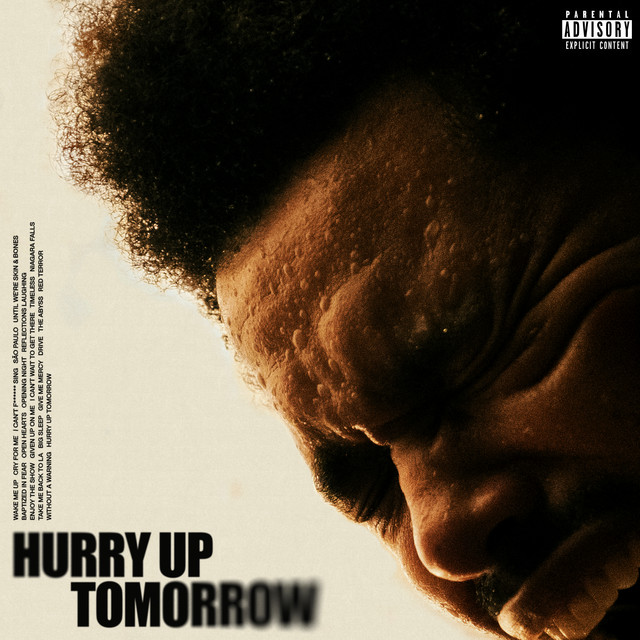
The Weeknd’s latest release, Hurry Up Tomorrow, is not only his final album under that stage name, but also marks the end of his five-year long album trilogy.
Continuing the themes explored in After Hours and Dawn FM, the new album delves into regret, mortality and addiction.
The album begins with “Wake Me Up” featuring Justice, seamlessly transitioning from the end of “Dawn FM” to the start of “Hurry Up Tomorrow.”
“Cry For Me” is a classic Weeknd song about heartbreak as he contemplates his life. Specifically, he makes great use of reverb towards the end with a hypnotic voice changer that adds some depth to the song
“I Can’t F*****g Sing” is a 12-second transition song to “São Paulo” featuring Anitta, a song that intertwines a driving baseline with recurring Spanish lyrics.
“Until We’re Skin & Bones” is the last short transition song of the album and creates a satisfying end from the harsh base of the previous song to the more mellow “Baptized in Fear.” This song describes The Weeknd’s attempted suicide by drowning in his tub.
The song seamlessly transitions into “Open Hearts,” weaving references to the purgatory concept described in Dawn FM. Its signature 80s-inspired beat calls back to After Hours’ smash hit “Blinding Lights.”
“Opening Night” marks a transition point in the album, addressing his struggle with fame and addiction. This song in particular has a recurring dial tone throughout, reinforcing the idea of isolation and detachment.
“Reflections Laughing” featuring Travis Scott, Florence + The Machine further explores how The Weeknd feels trapped by his fame and how he uses drugs as an escape. Halfway through the song, we hear calls from his friend pleading with him to stop doing drugs.
In “Enjoy the Show” featuring Future, The Weeknd delves deep into substance abuse, with the Weeknd contemplating overdosing. His lyrics reflect a yearning for eternal youth and the hope that his fans will mourn his death if he dies young.
“Given Up On Me” is a complicated song when The Weeknd feels at his lowest. He pleads with the listener to give up on him, as he has given up on himself. Halfway through, the song drastically switches from a trap beat to a calm piano as he explains that drugs, which he calls “sunshine,” are not good for him, but he needs them. The song ends with a baseline that increases in speed and intensity, meant to symbolize drug use.
“I Can’t Wait To Get There” marks another turning point in the album where The Weeknd describes the things he wants to do with his life like reconnecting with his father.
“Timeless” featuring Playboi Carti is the most popular song of the album and currently The Weeknd’s overall most popular song on Spotify. The song is a seamless blend of rap, ethereal vocals and background instrumentals.
“Niagara Falls” describes a relationship between The Weeknd and a woman who was taken. The song ends with the line “Going back in time” repeated twice which transitions well into the next song.
“Take Me Back to LA” is an obvious reference to the song “Escape From LA” from After Hours. However, in this song, The Weeknd longs for the time back when he lived in LA. He reveals that after he left, he learned to be alone and, despite that, he longs for connection.
“Big Sleep” featuring Giorgio Moroder is another turning point in the album. The song uses almost ghostly vocals to capture the feeling of falling asleep forever. In the final lines of the song, he sees God as his soul resurrects.
In “Give Me Mercy,” The Weeknd repeatedly pleads to God for mercy on his soul and forgiveness for his sins. He understands that he succumbed to temptation in his life and even lost his faith, but hopes He will understand.
“Drive” is another clever reference to the purgatory in Dawn FM. In that album, The Weeknd imagines purgatory as listening to a radio in a car. In this song, he reveals that he does not want to waste God’s time and he just wants to drive the car instead of waiting.
In “The Abyss” featuring Lana Del Rey, The Weeknd ponders another suicide attempt by jumping off a building and justifies his suicide by calling it dignified. He watches an unknown person as he falls and asks them to tell him they love him too because it was the only thing that gave him life.
In “Red Terror,” The Weeknd remembers caring for his son and expressing remorse that he has to die. He tries to comfort him by saying “death does not count” and “Everything remains exactly how it was.”
“Without a Warning” shows The Weeknd finally resolving to kill himself. He states multiple times “I don’t suppose tomorrow’s comin’” and hopes the crowd will love him to his last day and beyond.
The final song in the album and its namesake, “Hurry Up Tomorrow,” is Weeknd’s final confession, as he lays bare his sins and hopes for salvation. He ends the album uncertain, wondering if he will find what he’s searching for in the afterlife.
